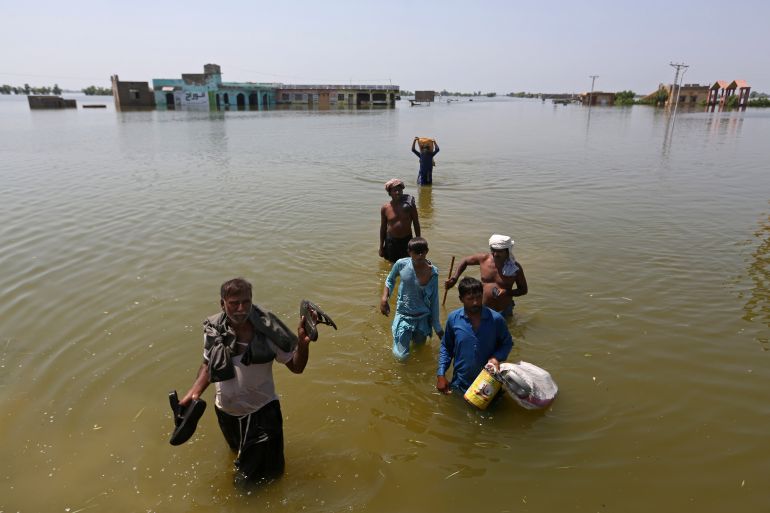UN ups flood aid appeal as Pakistan enters ‘second wave of death’
World body now seeks $816m for flood-relief efforts, up from initial appeal in August for $160m.

Islamabad, Pakistan – The United Nations has increased its aid appeal for Pakistan, where more than five million people are facing a severe food crisis in the wake of recent catastrophic floods.
Nearly 1,700 people, including more than 600 children, lost their lives and a total 33 million people were affected after record-breaking rains began lashing Pakistan in June.
Keep reading
list of 4 itemsAre seed-sowing drones the answer to global deforestation?
Rainfall set to help crews battling wildfire near Canada’s Fort McMurray
How India is racing against time to save the endangered red panda
Julien Harneis, the UN’s humanitarian coordinator for the country, said on Monday that the world body was now seeking $816m for flood-relief efforts, up from its initial appeal for $160m in August, when heavy rains and floods swept through much of Pakistan.
“We are now entering a second wave of death and destruction. There will be an increase in child morbidity, and it will be terrible unless we act rapidly to support the government in increasing the provision of health, nutrition and water and sanitation services across the affected areas,” Harneis told reporters at a media briefing in Geneva.
The Pakistani government and UN have both repeatedly blamed climate change for the floods and sought debt relief as a means to support the country.
In its latest report on Saturday, the UN Office for the Coordination of Humanitarian Affairs (OCHA) said 8.62 million people in 28 assessed districts were estimated to be in crisis and enduring the emergency phases of food security between September and November 2022, “including some 5.74 million people in flood-affected districts covered by the assessment”.
The OCHA report also noted that “water-borne and vector-borne diseases” are of “growing concern”, particularly in the hard-hit provinces of Sindh and Balochistan.
It added that close to 1.6 million women of reproductive age, including nearly 130,000 pregnant women, need urgent health services.
Addressing the UN General Assembly late last month, Pakistani Prime Minister Shehbaz Sharif said his country has been facing the wrath of climate crisis – even though it had little responsibility in causing it.
“Pakistan has never seen a starker and more devastating example of the impact of global warming … Nature has unleashed her fury on Pakistan without looking at our carbon footprint, which is next to nothing. Our actions did not contribute to this,” he said.
UN Secretary-General Antonio Guterres said during a visit to Pakistan in September that he had “never seen climate carnage” on such a scale.
Guterres also blamed rich countries for the crisis, as Group of 20 (G20) developed nations are responsible for 80 percent of current carbon emissions.
In Pakistan, the flooding situation was exacerbated by the melting of glaciers, resulting in one-third of the country being submerged when floods were at their peak.
The floods have wracked the economy of the country at a time when it was already facing a financial crunch, with authorities putting the cost at an estimated $30bn.
Pakistan only managed to stave off default as it secured a loan package of $1.17bn from the International Monetary Fund in late August.